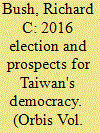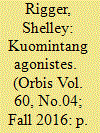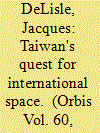| Srl | Item |
| 1 |
ID:
148087


|
|
|
|
|
| Summary/Abstract |
This article reviews the results of the 2016 presidential and legislative elections in Taiwan, in which the Democratic Progressive Party (DPP) won a sweeping victory. It identifies the likely reasons for the DPP's success and then explores the implications of the outcome for Taiwan's political future, relations with Mainland China, and relations with the United States.
|
|
|
|
|
|
|
|
|
|
|
|
|
|
|
|
| 2 |
ID:
148089


|
|
|
|
|
| Summary/Abstract |
This year's Taiwan elections gave the Democratic Progressive Party a clear mandate to rule Taiwan again. Since 2014 Taiwanese millennials have played a decisive role in Taiwan's significant democratic change. The elections can be appreciated best in the context of the changing state-civil society relations of the preceding eight years of 2008-2015. The revival of civil society activism since 2008 and the explosive force of the Sunflower Movement in 2014 finally transmitted social activism into electoral politics. President Tsai responded to these changes in her inaugural address by placing cross-Strait relations in the context of regional peace and stability and making no mention of the“1992 Consensus.” Instead, she emphasized domestic development and reforms to safeguard Taiwan to be a democratic and free country.
|
|
|
|
|
|
|
|
|
|
|
|
|
|
|
|
| 3 |
ID:
148088


|
|
|
|
|
| Summary/Abstract |
Taiwan's Kuomintang (KMT) lost badly in the 2016 elections. The KMT had not garnered favorable public opinion under the previous president, Ma Ying-jeou. Nor were Ma and his party seen as promoting a vision to put Taiwan first. Consequently, they were defeated soundly by the Democratic Progressive Party. This article addresses how the parties differ historically and why it matters what direction Taiwan's leadership takes in the future.
|
|
|
|
|
|
|
|
|
|
|
|
|
|
|
|
| 4 |
ID:
148095


|
|
|
|
|
| Summary/Abstract |
The particular difficulties that Taiwan's new administration faces are paradoxical, for their origin no longer has to do with ensuring the continuing existence of the state. That seems assured. Rather, the challenges arise because U.S. and China's diplomacy in the 1970s assumed that Taiwan was going to disappear, but it failed to do so. This fact created an embarrassing—and probably insoluble—long-term problem for China. To be sure, much commentary still suggests that if not on the verge, Taiwan and China are at least on a one-way road to unification, shadowed by the concern that China will not wait forever, ready to “impose” unity when it is finally fed up.
|
|
|
|
|
|
|
|
|
|
|
|
|
|
|
|
| 5 |
ID:
148090


|
|
|
|
|
| Summary/Abstract |
Taiwan changed from a traditional agriculture society into an industrialized modern country within roughly one century. This fast development was regarded as a model for developing countries. Taiwan together with Hong Kong, Singapore, and South Korea became known as the Four Asian newly industrialized countries (NICs) in the 1970s, recognized for their successful economic development. However, on its way to becoming a high-income developed country, Taiwan encountered a number of difficulties. Some of them might have been caused by the political threat from China, but there were other challenges that were common to many middle income countries. Taiwan's experiences of the latter may offer lessons to other developing countries. The difficulties for Taiwan caused by China may offer more alarming lessons for countries—including developing countries—that face growing interactions with China.
|
|
|
|
|
|
|
|
|
|
|
|
|
|
|
|
| 6 |
ID:
148093


|
|
|
|
|
| Summary/Abstract |
This article contends that the Tsai administration will likely be positive for U.S.-Taiwan relations. While the partnership may well require more work than was expended over the last eight years, the yield may be significant.
|
|
|
|
|
|
|
|
|
|
|
|
|
|
|
|
| 7 |
ID:
148094


|
|
|
|
|
| Summary/Abstract |
Under the administration of Taiwan's first woman president, Tsai Ing-wen, Taiwan-Japan relations are likely to deepen while relying, as far as possible, on non-governmental and quasi-governmental working relationships. This reflects the Japanese government's desire to avoid friction with China while endeavoring to protect its strategic and economic interests by partnering with Taiwan. Concern about these developments is already evident in the People's Republic of China.
|
|
|
|
|
|
|
|
|
|
|
|
|
|
|
|
| 8 |
ID:
148091


|
|
|
|
|
| Summary/Abstract |
As President Tsai Ing-wen assumes power, she faces a citizenry hoping that she can revitalize Taiwan's economy, including: promoting high growth, low unemployment, equitable distribution of income, affordable housing for working people, food safety and quality of life in a democratic country. They also expect that she will not be deterred from engaging in the international arena. However, President Tsai faces several challenges amid slowing growth in much of the world, and Taiwan's partial exclusion from the international economic order will affect prospects for her success in meeting expectations for further economic progress.
|
|
|
|
|
|
|
|
|
|
|
|
|
|
|
|
| 9 |
ID:
148092


|
|
|
|
|
| Summary/Abstract |
Taiwan's “international space” has been a vital concern for the nation's leaders, and increasingly so as China has grown in power, influence, and ability to “squeeze” Taiwan's international space and thereby undermine the international stature that matters for Taiwan's security. President Tsai Ing-wen inherits a legacy of multi-pronged efforts and some successes, and will seek to build on them as she pursues her own distinctive approach. But she must do so in the face of continuing, and possibly increasing, resistance from Beijing and amid uncertainty about the policies of key states, including China and the United States.
|
|
|
|
|
|
|
|
|
|
|
|
|
|
|
|